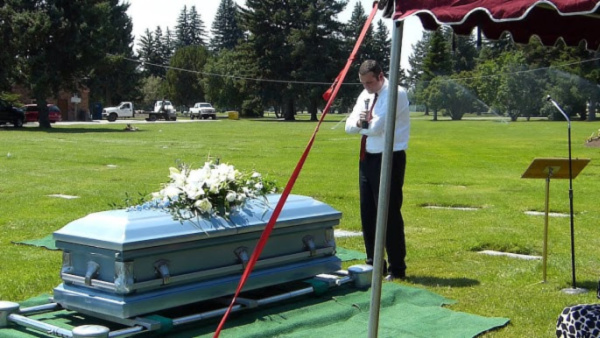Question
Gramps,
I have an audio recording of my Grandpa’s funeral from 1990. I have transcribed it and would like to put it into a history book I am making of him. Is it appropriate to transcribe and put in the prayers and the dedication of the grave in a family history book? I can’t find a policy on it but the prayers are like talks and show the feeling/faith of the individual. I wanted to ask someone since I can’t find the Church policy on it. Thank!
Michelle
Answer
Michelle,
In the journey of documenting family histories, many individuals encounter moments of profound significance—moments that often include prayers and grave dedications. For members of The Church of Jesus Christ of Latter-day Saints, these acts hold a sacred place in the tapestry of family heritage. But is it appropriate to transcribe these prayers and dedications into family history books?
Within the theology of The Church of Jesus Christ of Latter-day Saints, the body is revered as a sacred entity, and the act of dedicating graves signifies deep respect for the deceased. The Church teaches that the body is a temple, and this belief elevates the act of grave dedication to a solemn occasion. Elder Bruce R. McConkie emphasized that dedicatory prayers should express thanksgiving and comfort, highlighting the importance of the words spoken during these moments.
The reverence surrounding these dedications is echoed in church practices, where prayers are not mere rituals; they are vital conversations with God. As one article notes, prayer serves as a means of guidance, comfort, and connection with Heavenly Father, making the act of transcribing prayers a deeply meaningful practice.
Family history work is a significant aspect of Latter-day Saint belief. It connects individuals with their ancestors and provides opportunities for performing saving ordinances for the deceased. The Church encourages the recording of family histories, which can include prayers and dedications, contributing to a deeper understanding of family heritage and spiritual journeys.
Transcribing prayers and dedications into family history books can serve as a bridge between generations. It allows descendants to connect with their ancestors’ spiritual experiences, fostering a sense of identity and continuity within the family. By preserving these sacred moments, families can create a rich narrative that honors their lineage while also providing context for future generations.
The act of transcribing prayers, including those of dedication, can be a meaningful way to honor the deceased. It allows families to preserve their traditions and express their love and respect for those who have passed. Personal testimonies and experiences related to these prayers can enrich the family history, creating a tapestry of shared beliefs and memories.
When documenting these sacred moments, it is essential to approach the task with respect and sensitivity. This includes accurately conveying the context and emotions surrounding the prayers. As emphasized by church teachings, the documentation should reflect not only the words spoken but also the deep feelings of love and reverence associated with them.
Adding them to Family Search would also allow others to enjoy these precious moments as well. Here is how you can upload audio files.
The Church Handbook provides guidance suggesting that family members can dedicate locations or graves where ashes are kept, indicating that specific spots or moments can hold spiritual significance. However, the focus must remain on the deceased’s legacy and the hope of salvation through temple work. Family history is not just a record; it is a testament to faith, love, and the eternal nature of relationships.
In their documentation, families are encouraged to reflect on the sacredness of the act. Including prayers and dedications in family history books is not only appropriate but also a way to continue the spiritual journey of their loved ones. It provides an opportunity to share their faith and experiences with future generations while honoring the values of the Church.
Transcribing prayers and grave dedications into family history books can be a sacred and respectful endeavor. When done with care and reverence, it enhances the family’s understanding of their heritage and provides a spiritual link to their ancestors. By honoring these sacred moments, individuals contribute to a legacy that reflects the love, faith, and traditions of their family.
As you embark on your family history journey, consider the significance of including prayers and dedications. These records not only commemorate lives lived but also enrich the spiritual tapestry of your family’s story, ensuring that the lessons, love, and legacies of the past are preserved for generations to come.
Gramps








